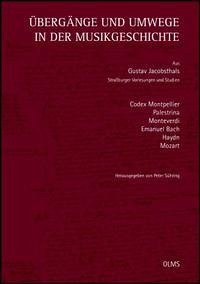Gustav Jacobsthal (1845-1912) vertrat 33 Jahre lang die Musikwissenschaft in Forschung und Lehre an der Universität Straßburg und er hinterließ für die Entwicklung des Faches bedeutsame Studien zur europäischen Musikgeschichte. Jacobsthals Nachlass ist in der Staatsbibliothek Berlin aufbewahrt. In der vorliegenden Publikation werden erstmals grössere Teile daraus veröffentlicht. Die Aufzeichnungen wurden vom Herausgeber diplomatisch transkribiert und mit Einleitungen und umfangreichen Erläuterungen versehen. Die Dokumente bieten einige Überraschungen: Jacobsthals Studien zum Codex Montpellier waren weit über Ansätze hinaus gediehen und geben andere Lösungen für die Gestalt der frühen Motetten als vermutet. Seine Interpretationen der Vokalpolyphonie Palestrinas geben Einblicke, die über den Horizont der „Berliner Schule“ hinausgehen. An Monteverdis Oper L’Orfeo entdeckt Jacobsthal die neuartige Ariengestaltung und Instrumentenbehandlung. Er stellt die prägende Rolle von Emanuel Bachs „Württembergischen Sonaten“ für die frühe Quartettproduktion Haydns und Mozarts vor und enthüllt die epochale Bedeutung von Mozarts Oper Idomeneo für die Überwindung der opera seria. *** Gustav Jacobsthal (1845-1912) was for 33 years the major figure in the study and teaching of music at the University of Strasbourg, and he left behind him a body of work on the history of European music which was of great significance in the history of the discipline. Jacobsthal’s archive is held by the State Library in Berlin. Major parts of it are published here for the first time. Jacobsthal’s manuscripts have been exactly transcribed by the editor, who also provides introductions and comprehensive notes. The documents offer some surprises: Jacobsthal’s studies of the Codex Montpellier went far beyond the basics and suggest alternatives to the usual solutions for the form of the early motets. His interpretations of Palestrina’s vocal polyphony offer new insights which go beyond the horizons of the ‘Berlin School’. Jacobsthal discovers new forms of aria and instrumentation in Monteverdi’s L’Orfeo. He demonstrates the seminal role of Emanuel Bach’s “Württemberg Sonatas” for the early quartets of Haydn and Mozart, and reveals the epoch-making significance of Mozart’s Idomeneo in transcending the genre of opera seria. The editor, Peter Sühring, was born in Berlin in 1946. He studied Music, Literature and Philosophy in Tübingen and Berlin and obtained his doctorate with a thesis on Mozart’s earliest operas. He lives and works in Berlin as a music historian and writer and has published works not only on Jacobsthal, whose papers he continues to edit, but also on the musical ideas of the French Enlightenment, on Mozart, Schumann and Heine, Spitta and Kretzschmar.
Bitte wählen Sie Ihr Anliegen aus.
Rechnungen
Retourenschein anfordern
Bestellstatus
Storno

